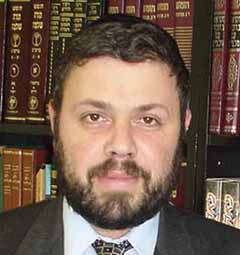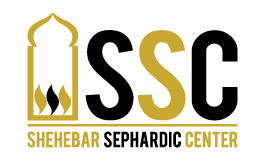
Born in Israel, Rabbi Haim Ovadia received his Semicha in 1991 from Israeli Chief Rabbi Mordechai Eliyahu after studying rabbinics at the Shehebar Sephardic Center. Rabbi Ovadia served as a hazan and assistant Rabbi at Communidad Hebrea Sefaradi de Bogota in Bogota, Columbia until 1996. In the same year he received a degree in Judaic studies in Bar-Ilan University before coming to the United States where he served as assistant Rabbi in Magen David in West Deal from 1997-99. He was associate rabbi at Beth Torah in Brooklyn until 2001.
In 2001 Rabbi Haim Ovadia became the Rabbi in Kahal Joseph in Westwood in Los Angeles, CA where after succeeding Rabbis Benzaquen and Rabbi Hillel Benchimol respectively, he continued their work in successfully increasing the awareness of Sephardim– mostly from Iraq, Israel and the Far East to bring them closer to their rich, ancient heritage.
During this time Rabbi Ovadia continued to further his studies, earning a Masters Degree from UCLA in Hebrew literature in 2004 and is currently pursuing a doctorate at Jewish Studies at Spertus College (Chicago). In addition Haim Ovadia has taught at the American Jewish University (formerly the University of Judaism) and currently teaches Rabbinic studies at the Academy of Jewish Religion (AJR).
Rabbi Ovadia served as the Rabbi at Kahal Joseph for six years before joining the Magen David of Beverly Hills (founded by Joe Fallas) in September 2008 where he served as its Rabbi. He is now in Rockville, MD serving as rabbi of Magen David Sephardic Congregation.
“I see myself primarily as an educator and the role of rabbi facilitates that function,” said Rabbi Ovadia. “My greatest achievement in LA is creating awareness of the more balanced Sephardi way of Jewish life and bringing thus peace to some individuals and families.”
Rabbi Ovadia sees himself as a link between the traditions of his Iraqi ancestors and the changes that are occurring within the Sephardic/Mizrahi community outside of the Middle East and North Africa.
His goal is to establish a Sephardic studies center in America to continue the preservation of the Sephardic culture as well as to create a library and intellectual hub where people will meet to discuss and study their heritage.
His greatest challenge is helping non-practicing Sephardic Jews return to their traditions while instilling a love and pride for their unique culture.
